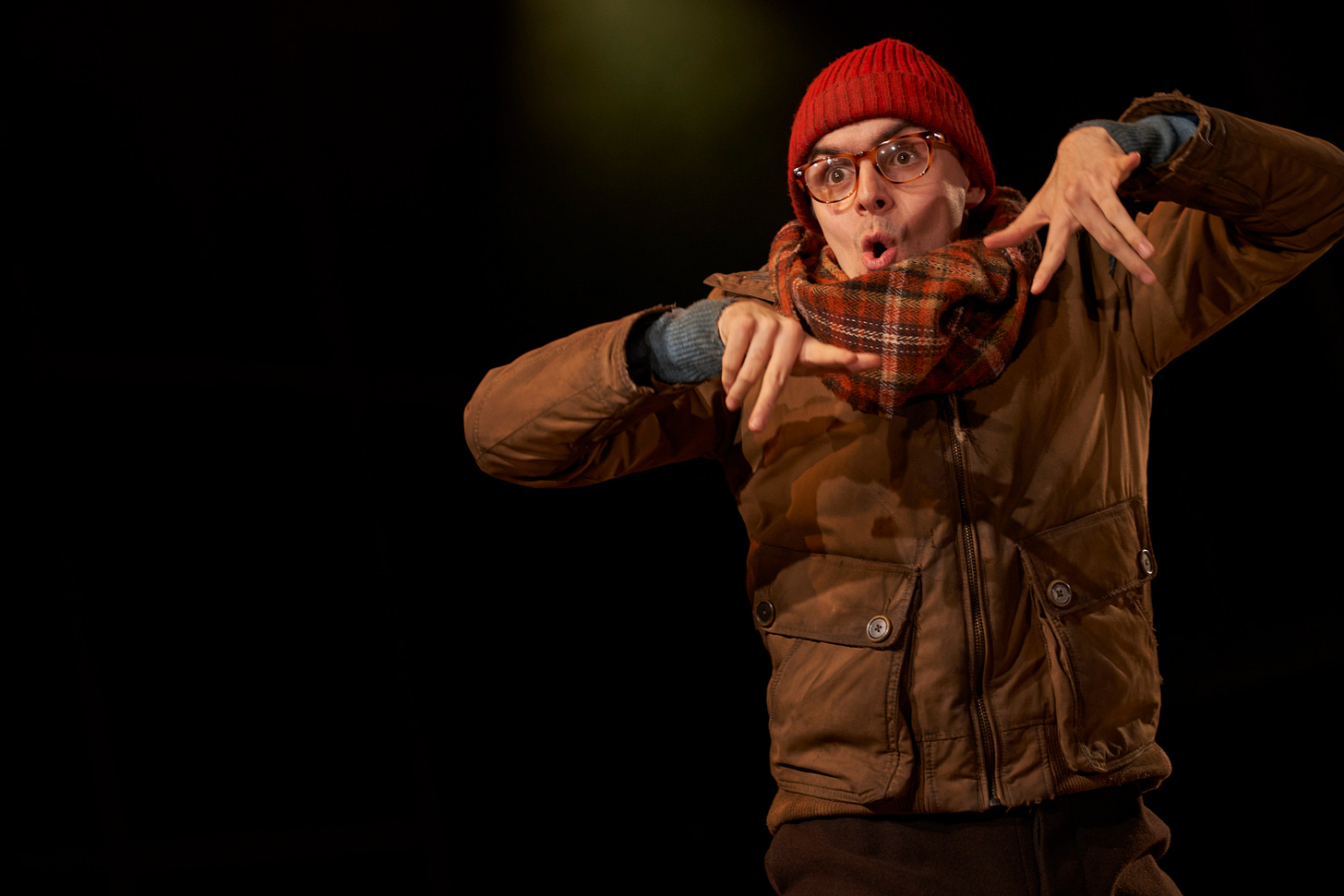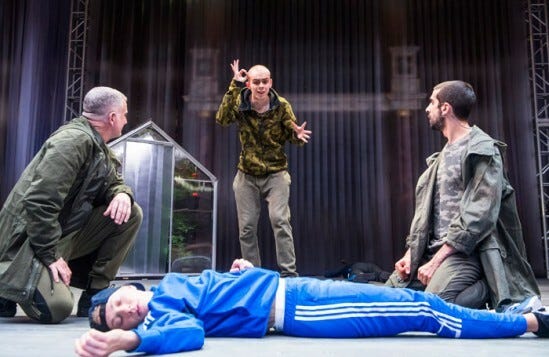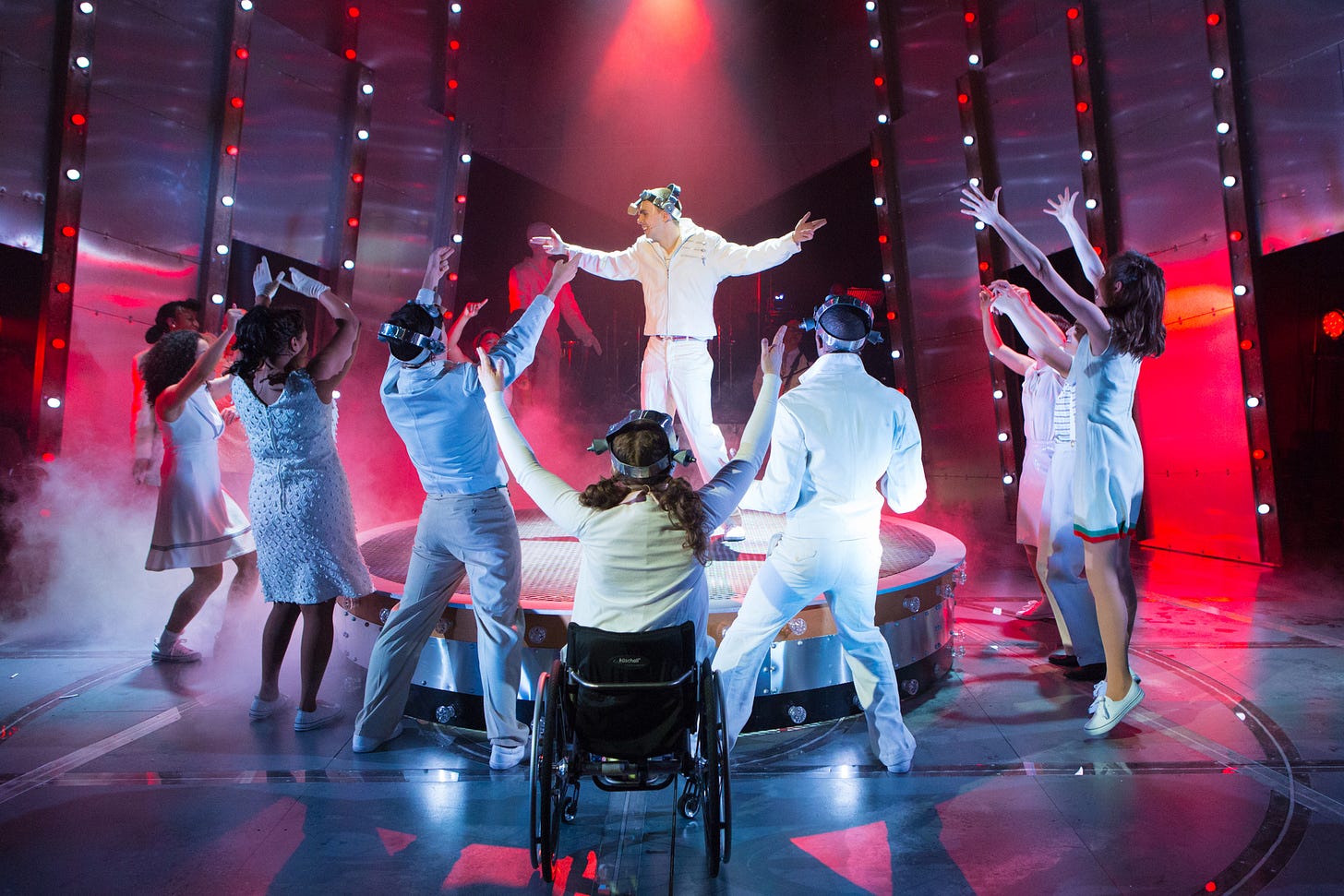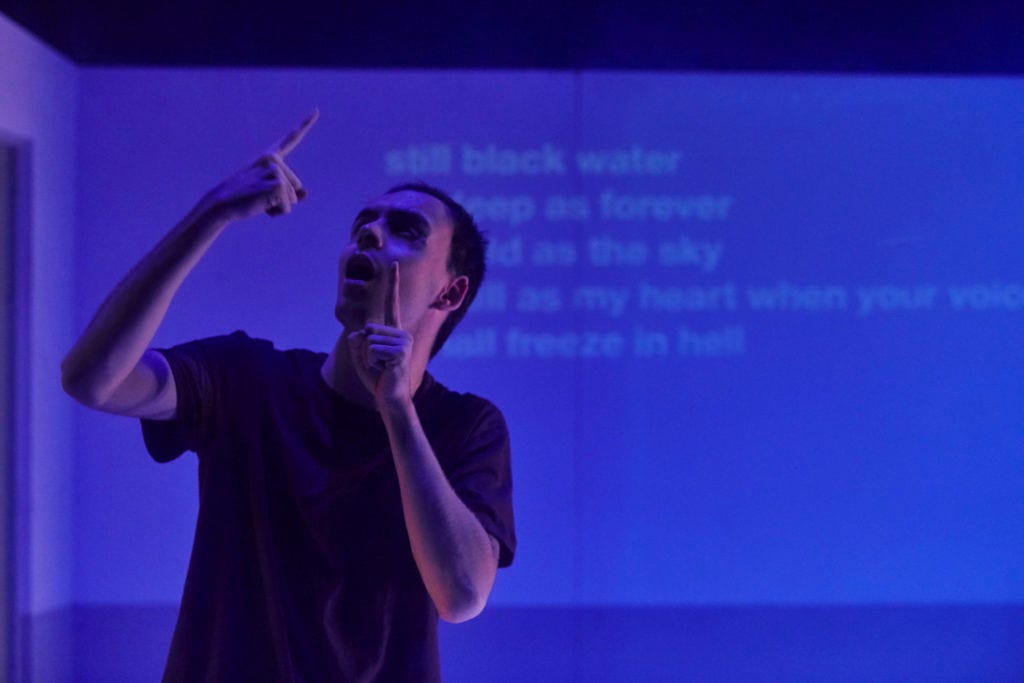Happy Friday…
How’s it going? It has been absolutely lovely up in Scotland this week - or in Edinburgh, at least - but I’ve not been able to enjoy it that much because I’ve had so much work. That all changes today, though. After I send this out, I’m clearing the decks and taking the doggo for a long, relaxing walk. I might even climb Arthur’s Seat if I fancy it…
Anyway, welcome to ninth issue of The Crush Bar, my fortnightly newsletter about theatre and the people that make it. If you haven’t subscribed already then please…
Below, you’ll find an interview with the Deaf actor William Grint, conducted a couple of weeks ago over Zoom with the help of a BSL interpreter - although I did at least manage to say hello with my hands.
You might’ve seen William in Imogen at The Globe, or in Ramps On The Moon’s production of The Who’s Tommy - that’s when I first came across him in 2017 - or in Deafinitely Theatre’s 4.48 Psychosis. Anyway, he’s a brilliant actor and an inspiring guy, and you can catch him in The Winter’s Tale on BBC4 on Sunday evening.
Oh, and one last thing. I’ve tried hard to make sure I use the correct language surrounding Deafness in this piece. If I’ve got it wrong at any point, I’m sorry - and please let me know how so I know for the future.
Right, that’s all for now. See you at the bottom…
Interview: William Grint
As an actor, William Grint has a question for casting directors. “If a role doesn’t absolutely have to be a hearing, speaking role, then why not give it to a Deaf person?” he asks. “It gives that character a whole new angle, a whole new, interesting story.”
And, as an audience member, he has got a question for theatres: can they use captions more often, please? At the moment, one or two performances might be captioned in an entire run, meaning Deaf people have only one or two chances to see a show, which they might not be able to make. As Grint points out, “Deaf people have social lives, too.”
Grint, who was born Deaf himself, has been breaking boundaries ever since he started performing as a teenager. He’s acted at Shakespeare’s Globe, at the Theatre Royal Stratford East, at Nottingham Playhouse, and he is about to make his delayed debut at the Royal Shakespeare Company. Not once, he says, has he let his Deafness dictate to his ambition.
“I grew up in a very supportive environment,” Grint says. “I just didn’t think that my deafness was ever going to stop me. Maybe I was too optimistic at times, but any issues I’ve faced, any problems I’ve had, I’ve always had that spirit to fight through them. That comes from the support of family and friends. They have helped me get to where I am today.”
“I want to see Deaf actors actors in a range of roles, where their Deafness doesn’t define them…”
Today, Grint is in Stratford-upon-Avon, where he has just finished filming the RSC’s new production of The Winter’s Tale. He was originally set to appear in the show in 2020, but the coronavirus pushed the production back a year, and from the stage to the screen – it is being broadcast on BBC Four on Sunday, the first time the company has premiered a show on screen instead of stage in its entire history.
“We were about to start performing The Winter’s Tale last March when the world turned upside down,” he says. “Everything was all systems go, and then suddenly I was back at home with my family. It was so sad, because it was a dream come true for me to get a job at the RSC. Filming it has been an amazing experience, though. I’ve learned loads.”
Grint plays the young shepherd in The Winter’s Tale – the character that breathlessly relates how Antigonus is attacked by a bear in Act III Scene III. It is, says Grint, the ideal role for him – the storytelling element “suits an actor who is very physical” so it is “perfect for a Deaf person”.
It is also exactly the sort of part Grint wants right now. A lot of the projects he has acted in have been focused on issues affecting the Deaf community, and although he knows it is important that he tells those stories, he does not want to be limited to them.
“I want to play characters who just happen to be Deaf, but have a story and a background outside that,” he says. “Of course, it is great to see more Deaf stories on stage, but I want to see Deaf actors in a range of roles, where their Deafness doesn’t define them. I would love to play Mercutio, for example. I would love to play Frankenstein, although I might be a bit young for that at the moment.”
Born in Camden in 1997, Grint says he has had a passion for performance ever since he was little. The physical comedy of Jim Carrey inspired him to take parts in school plays, but it was when he joined Deafinitely Youth Theatre – the youth arm of Paula Garfield’s acclaimed company – that he started to seriously consider a career in acting.
“I can’t thank Deafinitely Youth Theatre enough,” he says. “Working with them is where my acting skills really developed, and everything I’ve done since is all down to them.”
Grint performed in several projects as a teenager – including short film Chasing Cotton Clouds – but his first professional stage role was at Shakespeare’s Globe in 2016, aged 19. He played Arviragus, a long-lost brother of the title character in Imogen, Matthew Dunster’s renamed, reclaimed production of Cymbeline.
“It was my first professional part, and my first Shakespearean role, too,” he remembers. “I was terrified before I went on stage, but the cast were lovely and I felt very safe. I remember stepping out on stage, seeing the audience, and thinking: ‘My God, I’m actually doing this.’ That show set me on the path to where I am now. That’s when I really knew I wanted to be an actor.”
The following year, he took on the title role in a national tour of The Who’s Tommy. The rock-opera revival was a co-production between Ipswich’s New Wolsey Theatre and Ramps On The Moon, a consortium of regional theatres dedicated to creating shows that normalise the presence of Deaf and disabled people on-stage, off-stage, and in the audience.
It was an extraordinary show that seamlessly incorporated several different methods of communication – spoken English, dance-like British Sign Language, captioning, backing singers, and more – and working on it was one of the best experiences Grint has had as an actor.
“I remember stepping out on stage, seeing the audience, and thinking: ‘My God, I’m actually doing this.’”
“It was so different to anything I had done up to that point,” says Grint. “As a Deaf person, being the lead character in a musical seemed like a huge challenge. But Ramps On The Moon’s whole ethos is accessibility, and I felt so comfortable with them. Working on that show was like seeing the blueprint for how people should work together in a Deaf and disabled cast.”
In 2019, Grint returned to work with Deafinitely Theatre – but this time as an adult in one of the company’s professional productions. He joined the cast of 4.48 Psychosis, Garfield’s revival of Sarah Kane’s final play, when Deafinitely took the show on a national tour. That, says Grint, was another completely different experience – and it required a completely different acting approach.
“Sometimes, a character in a show just uses BSL like they would in real life,” Grint explains. “In Tommy, the signing was much more like a dance, because it is a musical. That production of 4.48 Psychosis was very movement-based, so the signing was very physical and fluid.”
“Shakespeare and Sarah Kane are obviously two completely different writers, so you need to work out the best way of delivering their messages,” he continues. “I’m happy to go with anything, personally, but I do think that it is important for the approach to match the tone of the production.”
The ability to use BSL in different ways in different productions is just one of the skills Grint has developed as a Deaf actor. Others include translation – Grint is often required to rewrite his own lines into BSL – and the learning of different hand gestures. BSL, Grint explains, has regional variations just like spoken English has accents, and it is important that those variations reflect the character he is playing.
“Translation can be complicated,” he says. “Often it is something that you work on with a director and with a BSL consultant. You have to make sure you keep the essence of the original, but you also have to make sure it makes sense relative to the other characters on stage at that point in that scene, too. It’s a fine balance.”
“When you are performing in something from the 19th century, for example, you would use a different style of signs to those you would use in a modern piece of writing,” he continues. “And depending on where the play is set – in Wales, in the North, in the South – there are different signs, too. You’ve got to have those up your sleeve as an actor, so that you can use them to match your character’s background.”
“It’s harder if I am the only Deaf member of a company because I don’t have someone who shares my language…”
The whole process of translation is made a lot easier if it is tackled by a team, rather than by individual actors. It’s something that Deafinitely Theatre and Ramps On The Moon understand, and that the RSC have understood as well. Grint is one of two Deaf actors in the company for The Winter’s Tale, alongside Scottish actor Bea Webster.
“It’s harder if I am the only Deaf member of a company because I don’t have someone who shares my language,” he explains. “I don’t have someone I can bounce ideas off. Here at the RSC, I’m working with Bea a lot, and that has been so helpful.”
Looking back over the years since he made his professional debut, Grint is pleased with the progress the performing arts industry has made in integrating Deaf and disabled people at all stages of the creative process – but he knows there is a lot more to do.
“There’s been a lot of progress,” he says. “Sophie Stone is doing amazing things on stage and screen. Rose Ayling Ellis is appearing in Eastenders. Actors like them are making big steps, but there is always room for more Deaf people – on-stage, off-stage, on-screen, behind-screen. I want more directors and casting directors to be open to casting Deaf and disabled actors in their shows.”
There is more room for them in the audience, too, adds Grint, and there are things theatres can do to make that happen - like captioning more than one performance in an entire run. Ideally, he continues, captioned performances “should be at least weekly, if not every other day.”
“There is always room for more Deaf people - on-stage, off-stage, on-screen, behind-screen…”
Right now, Grint is gearing up for his next challenge – appearing in his second RSC show, The Comedy Of Errors, in the company’s new outside theatre in July. Performing totally in the open air, he says, will be another new experience.
Beyond that, he is increasingly interested in developing his own work on stage and screen. In 2019, he wrote and directed an award-winning short film - a hilarious, three-minute comedy-horror called Ava, that he and his friend co-produced “for the price of a pizza” – and he is keen to explore writing and directing more, alongside acting.
“I really like the idea of making work myself,” he says. “I love seeing my own ideas come to life. And my Deafness is not going to stop me.”
“The most helpful thing someone could do for me is…”
Don’t be scared. That’s the most important thing for me. Please don’t be scared. If you have a question about Deafness, just ask. I don’t bite.
“If you want to get an idea of what I do…”
Recently, I watched The Queen’s Gambit and felt like I could identify with the lead character. She’s entering a world that is male-dominated and she is able to break every barrier to get where she wants to be. This is kind of similar to Deaf people trying to fit into the hearing-dominated society, and for me it is a bit like a Deaf actor doing Shakespeare - it breaks barriers! It also got me playing chess which is fun when there’s not that much to do!
Bits and bobs, shouts and murmurs…
I interviewed Judith Dimant - who was producer of Complicité for 25 years - for The Stage, and she was lovely! I also interviewed Kerry Ellis, who is from Suffolk, like me! And I wrote about whether or not the Edinburgh Fringe should happen this year!
Naomi Obeng and Emmanuel Kojo have guest edited an excellent, important special feature on racism and theatre criticism for The Stage, too. One of their recommendations to help tackle it is for existing critics to mentor PoC who might be interested in reviewing - so if you, or anyone you know, wants some of my limited wisdom, then get in touch!
If you want to hear more about The Winter’s Tale, composer Isobel Waller-Bridge was on Front Row last night, talking about how she approached writing the music for a Shakespearean play of two halves…
…And if you want to read more about it, then Andrew Dickson has visited the set and interviewed director Erica Whyman for The Guardian. As has Sarah Hemming for the FT.
Carbon-neutral company Pigfoot Theatre are doing a digital tour of their award-winning climate comedy How To Save A Rock. They are off-setting the digital footprint of the tour - and you can buy tickets for it here.
And my sister wrote a book - her fourth. Please buy it. And the first three.
Byeeeee…
Thanks for reading. Thanks for subscribing. Thanks for sharing. The next issue will be along in a fortnight’s time - interviewee TBC, but I have some absolute bangers lined up over the next few issues, so stay tuned. And, if you want to be a real dear, give this one a wee share. Email. Tweet. Shout. Spread the word.
If you want to get in touch for any reason, you can just reply to this email, or contact me on Twitter - I’m @FergusMorgan. Right, come on doggo. Walkies…
Fergus x







Hello. I was wondering if you have any contact details for William Grint, or could let me know how I could contact him? I am Access & Support Coordinator for DaDa in Liverpool. Many thanks, Denise Kennedy